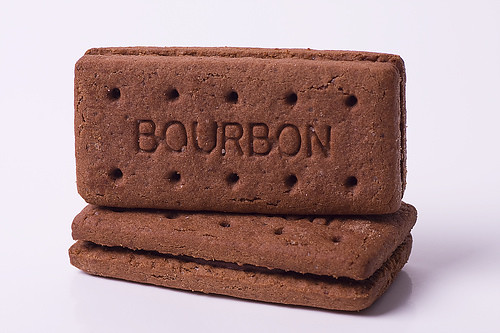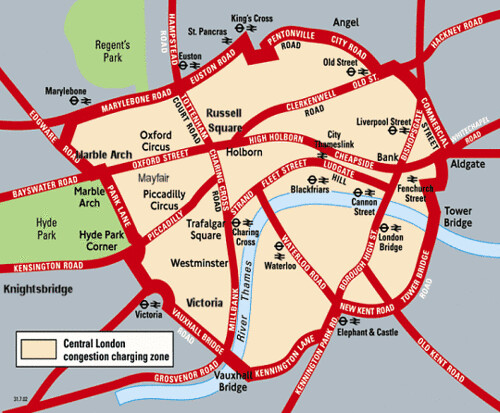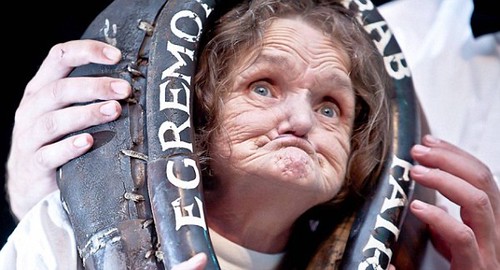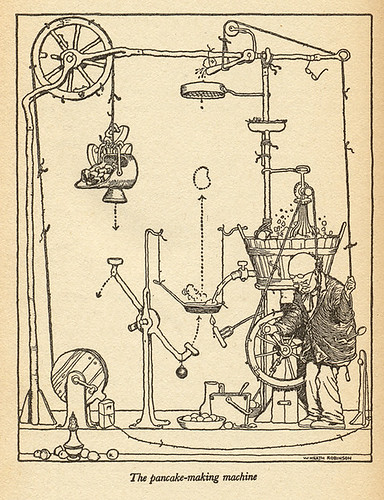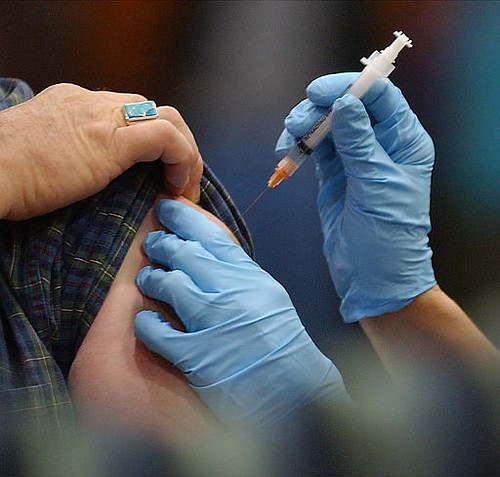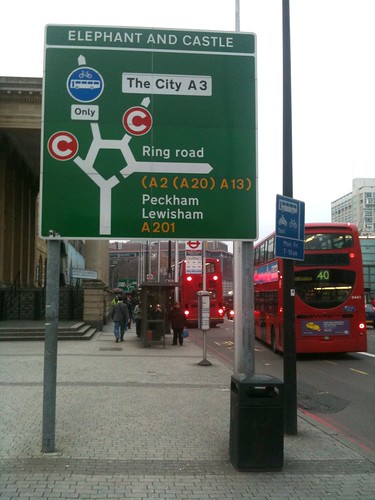Two nations, divided by a common language. Yes, we speak English in Canada, and yes, they naturally speak English here in England, having pretty much invented it. However, every day I run up against words that are new to me, or are used in a very different way than we might use them in Canada. So here I offer up my own glossary of sorts, which I hope to update whenever the mood strikes.
A&E, short for: Accident and Emergency = The Emergency Room.
anorak = Yes, technically an anorak is one of those wind/waterproof jackets, but that’s not what you’re here to find out, is it? Colloquially, an anorak is that particular type of person who pursues an odd and useless hobby obsessively. Generally poor in social situations, trainspotters are classic anoraks. Perhaps used thusly: “Gerard has got a complete set of milk bottle lid liners featuring all the characters from ‘E.T. The Extraterrestrial’ He cornered me at Janet’s party last week to explain the difference between the early edition Drew Barrymore lid liner with a typo and the later, corrected version, printed with different ink. It took me 45 minutes to escape. Christ, he’s such an anorak!”
BACS = originally an acronym for Bankers' Automated Clearing Services. It’s a method of sending and receiving money directly from/to your bank account. To send money you need the recipient’s account number and sort code, which is printed right on their bank card, and people happily give out this information whenever required. BACS is incredibly common, easy and fast. My salary is paid by BACS, and I pay my rent by BACS. (As distinct from CHAPS, see below)
bin = garbage can
bin man = garbage man
bins = Yes, it's the plural of bin, but strangely it's also a slang term for glasses (the kind that correct your vision, not the kind you serve beverages in). As in, "Where's me bins?"
bog = toilet (colloquial)
bog roll = toilet paper (colloquial)
bog standard = ordinary, normal, unremarkable. As in “Bourbon cream biscuits are bog standard.”
bollocks = literally: testicles. Colloquially: bullshit, crap, hogwash
bonnet = hood of a car
boot = trunk of a car
bottle = nerve, guts. As in “I was going to call the police on that awful man who ran over Murgatroyd, but I lost my bottle when he pulled out a flickknife.”
“Chalk and cheese” – A phrase describing things that are so dissimilar in nature that they can’t be fairly compared, like “apples and oranges”. It’s also often used to describe people who are very different, as in “That Gavin and his brother, I can’t believe they’re related. They’re chalk and cheese!” (Note: In reading up on the phrase – yes, I actually do research some of this stuff – I came across a few variations from other languages some of which are too delicious not to share. Lots of languages employ the slight variant of “apples and pears” (boring), Latin American Spanish compares “potatoes and sweet potatoes” (yawn), and the Welsh compare “honey and butter” (slightly better). However, the Serbs employ the much more interesting “grandmothers and toads” comparison, and the Russian use the more abstract “warm and soft”. But I think the prize goes to the Serbians. When they contrast two wildly dissimilar things, they compare “the cow to the longjohns”. Of course.)
CHAPS payment = Clearing House Automated Payment System. An alternative to BACS, but it takes longer to clear.
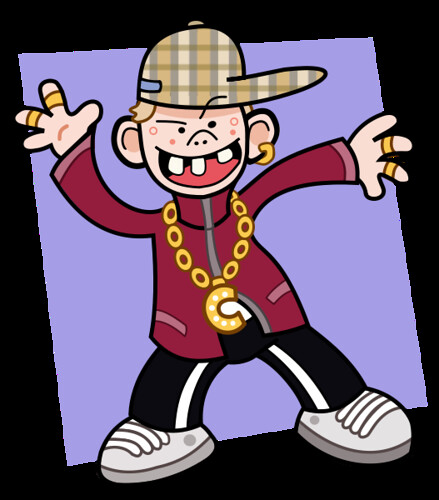 chav = also chavvy, pronounced with the hard CH like in “cheese”. A chav is that particular type of aggressive teenager (or even their parents and grandparents), usually from a working class background, that wears a large, stiff-peaked baseball cap (often at a 90 degree angle), a track suit, and a bizarre amount of chunky, shiny jewelry. Best known for engaging in anti-social behaviour, congregating on street corners, heavy drinking, drug-taking and general rowdiness. Bizarrely, chavs have adopted the Burberry tartan as their tribal dress to such a degree that Burberry itself now only uses the distinctive tan, black and red pattern on inner linings and other low-key articles. (I declined to go out to capture a picture of chavs in their native habitat, because I am not stupid.)
chav = also chavvy, pronounced with the hard CH like in “cheese”. A chav is that particular type of aggressive teenager (or even their parents and grandparents), usually from a working class background, that wears a large, stiff-peaked baseball cap (often at a 90 degree angle), a track suit, and a bizarre amount of chunky, shiny jewelry. Best known for engaging in anti-social behaviour, congregating on street corners, heavy drinking, drug-taking and general rowdiness. Bizarrely, chavs have adopted the Burberry tartan as their tribal dress to such a degree that Burberry itself now only uses the distinctive tan, black and red pattern on inner linings and other low-key articles. (I declined to go out to capture a picture of chavs in their native habitat, because I am not stupid.)
“Cheap as chips” – When something is really inexpensive, it’s cheap as chips. The phrase is so well known and used so much it’s often shortened to simply “cheap as…”. As in “Let’s go round to the curry place down the street. It’s cheap as.”
cheeky = impudent, sassy, mouthy, mischievous. A mild rebuke, but can also be a bit affectionate. As in, “That cheeky lad pinched my bottom!” Also used to mean quick or sly, as in “Fancy a cheeky drink down the pub while the wife’s out?” Cheek can also be used as a noun, often in phrases like, “I’ll have no more of your cheek young man!”.
chips = fries. Often served with vinegar, they are a side dish for EVERYTHING. Fish and chips. Pie and chips. Sausage and Chips. Lobster and chips. Chips and chips. You get the idea.
council flat = a subsidised apartment provided by the local council. Usually in a block of flats (apartment building) that’s often stuck in among a whole bunch of other blocks of flats in a “council estate”, some of which are unbearably dire, and some of which are nice enough that they’ve been turned into condos.
 Very typical council flats, those these ones are on the nicer side. I’ve seen a lot of these that have been converted to private ownership. Interestingly, here there seems to be no separate term for an apartment that’s owned as opposed to rented. There’s no equivalent term for “condo”
Very typical council flats, those these ones are on the nicer side. I’ve seen a lot of these that have been converted to private ownership. Interestingly, here there seems to be no separate term for an apartment that’s owned as opposed to rented. There’s no equivalent term for “condo”
crisps = potato chips. Standard flavours include Ready Salted, Salt & Vinegar, and Cheese & Onion. More exotic varieties are: Gammon & Mustard, Prawn Cocktail, and Roast Ox (the last quite tasty, thank you very much.)
“Does my head in” = Gives me a headache, is annoying. As in “That stupid haircut of James May’s does my head in!”
dole = unemployment insurance payment
estate car = station wagon. That is all. Really, what more can I say?
faffing about = wasting time, messing around endlessly with minor, often pointless tasks. It's a great phrase, perhaps used like this: "For God's sake would you please stop faffing about and get your coat on? I'm bleeding from four different orifices and I need you to drive me to the A&E!"
flat = apartment
flickknife = switchblade.
football = soccer
fortnight = Two weeks. I guess it’s a short form of “fourteen nights”.
full stop = period - the punctuation mark that appears at the end of a sentence. Also used colloquially the same way we use period. As in, “You’re not going anywhere until you apologise for running over poor Murgatroyd and that’s all there is to it, full stop!”
geezer = A generic term for any male person, not just a very old one
”Give it a bit o’ welly!” – A phrase used to request a greater level of effort be employed in the task at hand. Similar to “put yer back into it!”. As in, “Come on now lads, give it a bit o’ welly! That 17 tonne pile of gravel isn’t going to shift itself!”
half twelve = twelve thirty (Also: half eleven, half one etc....)
hire = rent. As in hire car (rental car) or tool hire (tool rental).
Heath Robinson device = Rube Goldberg device. An absurdly complicated and overdesigned machine to achieve a simple result, named after the British cartoonist. I imagine these to involve lots of old boots on the end of levers knocking over buckets of water... that kind of thing. And I love that they have a whole different guy for that over here. (Except that I keep mistaking myself and saying "Heath Ledger Device" which is not right at all.)
hockey = field hockey. Real hockey is always referred to as “ice hockey”, which drives me nuts.
 “It’s not cricket” – something that’s unfair or unsportsmanlike can be referred to as “not cricket”. The phrase is derived not from the insect but from the game of cricket, which is held up as a gentlemanly ideal of good sportsmanship and fair play, an important concept for the English. For instance, recently it’s been revealed that hundreds of coveted 2012 Olympics tickets have been held back from public sale and reserved for VIPs, which is not cricket. (Nevermind that the game of cricket has recently had troubles of its own, especially related to game-fixing by the Pakistani international squad last summer. Several Pakistani bowlers were accused of taking bribes to bowl “no balls” at specific points in the game, which is most certainly NOT CRICKET.)
“It’s not cricket” – something that’s unfair or unsportsmanlike can be referred to as “not cricket”. The phrase is derived not from the insect but from the game of cricket, which is held up as a gentlemanly ideal of good sportsmanship and fair play, an important concept for the English. For instance, recently it’s been revealed that hundreds of coveted 2012 Olympics tickets have been held back from public sale and reserved for VIPs, which is not cricket. (Nevermind that the game of cricket has recently had troubles of its own, especially related to game-fixing by the Pakistani international squad last summer. Several Pakistani bowlers were accused of taking bribes to bowl “no balls” at specific points in the game, which is most certainly NOT CRICKET.)
jobsworth = The kind of pedantic git you encounter in the workplace who adheres to rules with fanatical strictness, often against all reason. Part “work to rule” and part jerk, a jobsworth is usually a low-ranking employee, technically untouchable (because they are, after all, just following procedure) and universally loathed. A jobsworth will exercise what tiny authority he might legitimately have to the greatest extent possible. The term derives from the oft-repeated phrase uttered by the common jobsworth: “I’m sorry I can’t let you do that, it’s more than my job’s worth.” For fans of “The Office” (US version), Dwight Shrute is a classic jobsworth.
kebab = doner kebab or donair. The mystery-meat-on-a spit served in pita bread. Pronounced “kuh – bab” to ryhme with “stab” NOT “Bob”. No, really, I promise you that's how it's pronounced. Best eaten when drunk.
kitchen roll = paper towel
knock-on effect = snowball effect. I never realized how geographically restricted that term might be...
loo = toilet. I could repeat some hogwash here that I heard from a London Walks tour guide last year about how chamber pots used to be emptied out of upper story windows along with a cry of “Guardy Loo”, a bastardization of the French for “Watch your eyes.” But I won’t. Except I just did. Damn. (Additional note: apparently using the term "loo" instead of "toilet" tends to mark one as more upper-class. Or perhaps it would be more accurate to say that using the word "toilet" instead of "loo" instantly informs an upper class person that you are NOT one of them. Other trigger words that mark you as one of the hoi polloi: "lounge" instead of "sitting room", "pardon?" instead of "sorry?" or "what?", "serviette" instead of "napkin", "dinner" instead of "lunch", "settee" instead of "sofa", and "sweet" instead of "pudding") (For the preceeding list I and indebted to the book "Watching the English" by Kate Fox, which, by the way, is excellent)
“Lost his rag” – got angry. Similar to “blew his top” or “blew his stack”. As in, “All I did was ask him to move his BMW off my foot and he totally lost his rag at me!”
”Muck in” – Pitch in, help out. As in “If we all muck in we’ll be done in an hour.” Or, “I don’t mind mucking in a bit, but where would I even start? The whole thing’s gone completely pear-shaped.”
nick = arrest. As in “While he was being nicked, the bloke had the cheek to pull a face at the copper!"
nick = steal. As in “I left my bike locked up at Vauxhall station one Thursday night and it got nicked.” Ironic isn’t it, that you can get nicked for nicking something?
nutter = just what it sounds like. In North America we’d say “nutcase” or “nut job”.
“On the piss” – as distinct from “taking the piss”. There are two different meaning for this phrase, and I strongly suspect one is derived from the other. In the first instance to be “out on the piss” is to spend a night out drinking excessively. As in “The lads are out on the piss tonight.” As a corollary, for reasons that should be obvious, something that’s “on the piss” is wonky, or leaned over, or otherwise not straight up and down. As someone who is frequently required to fit large, bulky or awkwardly shaped items into the back of trucks, it’s a useful phrase. As in, “I don’t think that thing will go in straight up and down, but it might fit on the piss.”

operating theatre = Operating Room. This is a favourite of cryptic crossword setters. They like to confuse with the phrase “theatre worker” meaning doctor or surgeon and not actor or stagehand. I find this particularly annoying. In fact, you could almost say it does my head in.
”Painting the Forth Bridge” – The Forth Railway Bridge is the famous Victorian-era cantilevered railway bridge in Scotland, which crosses the Firth of Forth between Edinburgh and Fife. It is, to put it mildly, rather on the large side. Hence the task of painting the bridge is assumed to be so immense and time-consuming that once you daub on the last brushful it’s time to go back to the other end and start over again. Thus, “painting the Forth Bridge” is a colourful way of describing a never-ending job. North Americans call this type of Sisyphean labour “painting the Golden Gate Bridge”. Sadly the phrase must soon be consigned to the bin because the Forth Bridge is currently getting a big makeover that involves blasting off every layer of paint until bare steel is revealed, making any necessary repairs, and then coating the whole bridge in some kind of super epoxy stuff that’s supposed to last for 25 to 40 years. This means the Brits will have to come up with some new phrase to denote a job that never ends; perhaps something else culturally appropriate like “Watching ‘Coronation Street’”. Or maybe we could simply say “blogging”.
pants = underwear. This is a really tough one, and one you don’t want to get wrong. What we think of as pants are “trousers”.
pants = Interestingly, “pants” is also an adjective that means lame or sucky. As in “The English World Cup team was totally pants".
paracetamol = acetaminophen-based pain reliever. Used generically, like we use Tylenol. As in "I went to the A&E bleeding from four different orifices and all they gave me was a bloody paracetamol and a tetanus jab"
“Popped his clogs” – Just one in the long line of irreverent phrases used to describe someone who is, well, dead. Like six feet under, kicked the bucket, pushing up the daisies, shuffled off this mortal coil…

porridge, doing = serving time in jail (though of course here that's spelled gaol. Strange but true.) Odd phrase... I believe it refers to the traditional breakfast served in prison. It would be used thusly: "Poor Nigel's doing porridge for running over a dachshund, pulling a flicknife on the owner, and then giving cheek to the Old Bill. He'll be gone for yonks."
proper = real. As in “Canadians play proper hockey, whereas the Brits run around on a field with curved sticks that are too short.” It’s also used in the sense of formal or correct, but more commonly in the first sense. I find myself using it that way all the time.
pub = Are you seriously telling me you don’t know what a pub is? Find yourself a different blog because you are seriously misguided. Perhaps you need a satnav…
pull a face, pulling faces = Making a face, making faces. I have no idea why one MAKES a face in Canada and PULLS a face here. However, pulling faces is part of a very odd rural English tradition, namely: gurning.
row = pronounced to rhyme with "how". A fight or argument. Can also be used as a verb - to row, or rowing (again, rhyming with "how")
rubbish = garbage, in both its literal and figurative senses. As in “Please put that rubbish in the bin.” and “That James May is full of rubbish!”
satnav, short for Satellite Navigation = GPS. Almost everyone with a car seems to have a satnav. The coolest come equipped with several different voices. I’m sure that’s the case in North America too, but in NA do you get the mellifluous Irish guy? I could listen to him all night, even if he’s just saying, “After.. 400 yards.. go left… at the roundabout…”
Jamie Carragher, a Scouser and footballer who plays for Liverpool, demonstrating a strong Scouse accent. Thank you for the subtitles.
sick = vomit (adjective and noun). If you say “I was sick yesterday” it doesn’t mean “I felt unwell” it literally means “I vomited”. It’s also a noun, as in “Watch your step walking past the pub on Sunday morning or you might tread in a puddle of sick.”
slapper = another word for a woman who will sleep with anyone. Any time. Anywhere.
“Sod it.” = Screw it. Also: “sod this”, “sod that”, “sod off”… you get the idea. “Sod” is also used in the rather more colourful phrase “Sod this for a game of soldiers!”, which generally means “Screw it, I’m not doing this anymore it’s too difficult / too expensive / no fun / not worth the effort.” For instance our man Nigel in the Land Rover, who has just flattened some poor woman's dachshund, might get tired of the situation and decide to make tracks at which point he he could preface his exit with “Sod this for a game of soldiers!”
"Sod's Law” – The British equivalent of “Murphy’s Law”, but with subtle and highly culturally revealing differences. Murphy’s Law is commonly quoted as “anything that can go wrong will go wrong”. Sod’s Law includes that idea but is broader, encompassing what Wikipedia calls “a general sense of being ‘mocked by fate’". Therefore Murphy’s Law would apply if you go out without an umbrella and it rains. Sod’s Law applies when you pack your umbrella, rain coat and wellies and the day turns out hot and sunny. Similarly the fact that Beethoven, the brilliant composer, became deaf… well that’s just Sod’s Law, innit? Do you see the distinction? Sod’s Law is for a people who don’t just expect that things will go wrong, but also expect an ironic twist of the knife while it’s all going down the pan. In other words, Sod’s Law is for the English.
stone = a unit of measure of weight equal to 14 pounds, which is bizarre and annoying to calculate in one’s head. Still, it’s the standard way to refer to the weight of people. As in the fictional (but not at all impossible) headline: “42 Stone Man forklifted out of council flat!" or the less likely “I lost 8 stone in just 7 weeks on the amazing 'Crisps and Kebabs Diet'”!
surgery = Doctor’s Office. It also means surgery as in “slicing open open of one’s body for medical purposes”, but if you’re making an appointment to see a GP, the appointment will be at the doctor’s surgery, even though they won’t actually perform surgery there. I find this really misleading and kind of alarming. It’s like calling barber shop a leechery. Maybe a few hundred years ago doctors did surgery at their surgery, but now they do it in an operating theatre.
tablet = pill. As in “Have you got any headache tablets? All this talk of jabs does my head in.”
“Taking the piss” – this is a phrase that goes right to the heart of all things English. To take the piss out of someone is to mock, tease or ridicule them, particularly someone who is especially full of himself. The English have a finely honed sense of when people are getting a bit too uppity, and are quick to deflate them when they do. So taking the piss is a combination of the Englishness of not pushing oneself forward, and the all-pervasive sense of humour, and it happens all the time. Whole TV shows are essentially just extended sessions of taking the piss (“Mock the Week”, anyone?).
“Taking the piss” can also be used to describe an action or situation that’s out of line or unfair. For instance, I recently tweeted about the price of a pint of lager shandy in a Richmond pub. £3.95? For a lager shandy? That’s just taking the piss.
The phrase is sometimes euphemistically changed to “taking the Mickey” in mixed company. I’ve even heard the phrase “taking the Michael” as a variation on Mickey. (“Mickey” is a Cockney rhyming slang substitution, but I’m not even going to contemplate getting into Cockney rhyming slang right now because that is most definitely a whole other post.)
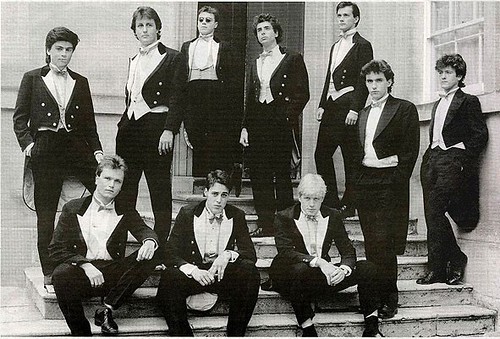 The famous photo of the Bullingdon Club. Cameron is pictured second from the left at the back. Also pictured is a young Boris Johnson, current Mayor of London, seated on the right. Johnson is also most certainly a toff. (Poor man, how could he NOT be, when his full name is Alexander Boris de Pfeffel Johnson?)
The famous photo of the Bullingdon Club. Cameron is pictured second from the left at the back. Also pictured is a young Boris Johnson, current Mayor of London, seated on the right. Johnson is also most certainly a toff. (Poor man, how could he NOT be, when his full name is Alexander Boris de Pfeffel Johnson?)
toilet roll = toilet paper
trousers = pants. (See above)
tube = the London Underground System
white van man = a rude, aggressive driver. Derived from the fact that many tradesmen such as builders, plumbers and electricians drive small panel vans commonly painted white to make it easier to put the “Joe’s Plumbing” logo on the side. Stereotypically a white van man is an overweight, chauvinist, wolf-whistling, rude-gesturing, speeding, obscenity-hurling tail-gater with builder’s butt (a.k.a plumber’s crack).
yonks = A very long time. As in “Nigel! I haven’t seen you in yonks, mate! Say, do you realise you’ve just run over that woman’s dachshund?”
A&E, short for: Accident and Emergency = The Emergency Room.
anorak = Yes, technically an anorak is one of those wind/waterproof jackets, but that’s not what you’re here to find out, is it? Colloquially, an anorak is that particular type of person who pursues an odd and useless hobby obsessively. Generally poor in social situations, trainspotters are classic anoraks. Perhaps used thusly: “Gerard has got a complete set of milk bottle lid liners featuring all the characters from ‘E.T. The Extraterrestrial’ He cornered me at Janet’s party last week to explain the difference between the early edition Drew Barrymore lid liner with a typo and the later, corrected version, printed with different ink. It took me 45 minutes to escape. Christ, he’s such an anorak!”
BACS = originally an acronym for Bankers' Automated Clearing Services. It’s a method of sending and receiving money directly from/to your bank account. To send money you need the recipient’s account number and sort code, which is printed right on their bank card, and people happily give out this information whenever required. BACS is incredibly common, easy and fast. My salary is paid by BACS, and I pay my rent by BACS. (As distinct from CHAPS, see below)
bless = an abbreviation of the phrase “Bless her/him/them!” used when reacting to something cute or sweet or adorable. As in “Is that a miniature dachshund puppy? Awwww… bless!”. Also used in the phrase “God bless his/her cotton socks”, which I am told is the mandatory suffix whenever referring to the Queen Mother (now sadly departed). As in “The Queen Mum God-bless-her-cotton-socks was a keen fan of the horses.”
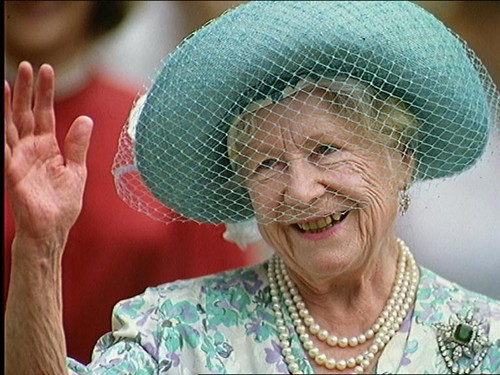 |
| Gratutious picture of the Queen Mother God-bless-her-cotton-socks |
bin = garbage can
bin man = garbage man
bins = Yes, it's the plural of bin, but strangely it's also a slang term for glasses (the kind that correct your vision, not the kind you serve beverages in). As in, "Where's me bins?"
biscuits = cookies. Though this usage is falling off a bit, in favour of cookies, which I find a bit sad.
The bourbon cream biscuit. In Canada, they’re usually only available as one selection in a bag of Peek Frean’s assorted. Here, they’re bog-standard. One of the many things I love about this place is the ample supply of bourbon creams.
bloke = utterly commonplace term for a male person. Used the same way, and with the same frequency that North Americans would use “guy”.
boffin = Ah, the great British boffin. It’s a term used to describe someone who is an expert in a scientific or technical field, often one that’s also somewhat arcane. It shows up in newspaper articles when some new bit of technical wizardry is unveiled, as in “The boffins at Apple have developed the new iPed, a foot-controlled touchscreen device for use by the flip-flop crowd.” I suppose it’s roughly equivalent to “nerd”, but used with more affection and even some respect, as if people have realized that boffins may wear pocket protectors, but they also built the space shuttle. This doesn’t stop kids from using it as an insult directed at anyone showing a spark of intelligence.
bog roll = toilet paper (colloquial)
bog standard = ordinary, normal, unremarkable. As in “Bourbon cream biscuits are bog standard.”
bollocks = literally: testicles. Colloquially: bullshit, crap, hogwash
bonnet = hood of a car
boot = trunk of a car
bottle = nerve, guts. As in “I was going to call the police on that awful man who ran over Murgatroyd, but I lost my bottle when he pulled out a flickknife.”
“Chalk and cheese” – A phrase describing things that are so dissimilar in nature that they can’t be fairly compared, like “apples and oranges”. It’s also often used to describe people who are very different, as in “That Gavin and his brother, I can’t believe they’re related. They’re chalk and cheese!” (Note: In reading up on the phrase – yes, I actually do research some of this stuff – I came across a few variations from other languages some of which are too delicious not to share. Lots of languages employ the slight variant of “apples and pears” (boring), Latin American Spanish compares “potatoes and sweet potatoes” (yawn), and the Welsh compare “honey and butter” (slightly better). However, the Serbs employ the much more interesting “grandmothers and toads” comparison, and the Russian use the more abstract “warm and soft”. But I think the prize goes to the Serbians. When they contrast two wildly dissimilar things, they compare “the cow to the longjohns”. Of course.)
CHAPS payment = Clearing House Automated Payment System. An alternative to BACS, but it takes longer to clear.
 chav = also chavvy, pronounced with the hard CH like in “cheese”. A chav is that particular type of aggressive teenager (or even their parents and grandparents), usually from a working class background, that wears a large, stiff-peaked baseball cap (often at a 90 degree angle), a track suit, and a bizarre amount of chunky, shiny jewelry. Best known for engaging in anti-social behaviour, congregating on street corners, heavy drinking, drug-taking and general rowdiness. Bizarrely, chavs have adopted the Burberry tartan as their tribal dress to such a degree that Burberry itself now only uses the distinctive tan, black and red pattern on inner linings and other low-key articles. (I declined to go out to capture a picture of chavs in their native habitat, because I am not stupid.)
chav = also chavvy, pronounced with the hard CH like in “cheese”. A chav is that particular type of aggressive teenager (or even their parents and grandparents), usually from a working class background, that wears a large, stiff-peaked baseball cap (often at a 90 degree angle), a track suit, and a bizarre amount of chunky, shiny jewelry. Best known for engaging in anti-social behaviour, congregating on street corners, heavy drinking, drug-taking and general rowdiness. Bizarrely, chavs have adopted the Burberry tartan as their tribal dress to such a degree that Burberry itself now only uses the distinctive tan, black and red pattern on inner linings and other low-key articles. (I declined to go out to capture a picture of chavs in their native habitat, because I am not stupid.)cheeky = impudent, sassy, mouthy, mischievous. A mild rebuke, but can also be a bit affectionate. As in, “That cheeky lad pinched my bottom!” Also used to mean quick or sly, as in “Fancy a cheeky drink down the pub while the wife’s out?” Cheek can also be used as a noun, often in phrases like, “I’ll have no more of your cheek young man!”.
cheers = Thanks. It’s also used in the way we think of it: as a toast while clinking glasses together. But it’s much more commonly heard now as a substitute for thank you. Sometimes lengthened to “Cheers for that”. And as ever in England it’s often used ironically, as in: “Ah, I see you’ve managed to reverse your Land Rover over my dachshund. Cheers for that.”
 |
| Gratutious picture of a miniature dachshund puppy. Awww... bless! |
chips = fries. Often served with vinegar, they are a side dish for EVERYTHING. Fish and chips. Pie and chips. Sausage and Chips. Lobster and chips. Chips and chips. You get the idea.
Congestion Charging Zone, or simply Congestion Zone = An area of Central London where each vehicle entering is charged a $£10 fee, with the intention that this will reduce congestion and pollution. Charges apply Monday to Friday between 7:00am and 6:00pm, and cameras monitor vehicles entering the zone, which is marked on signs and on the roads themselves with a big white “C” inside a red circle. Drivers have to pay the fee the same day or the next day, and can do so online, by phone, by text message or in some shops. If you fail to pay and are detected by one of the cameras, a hefty fine is levied (between £60 and £180 depending on how prompt you are with paying). Some vehicles are exempt from the Congestion Charge, including buses and taxis, ambulances, police cars, fire trucks (phew) and, recently, alternative fuel vehicles. Foreign-registered cars are not exempt, but lack of infrastructure to track down offending vehicles not registered in the UK means that miscreant visitors generally get a pass. Interestingly, it seems that foreign diplomats and embassy personnel are particularly flagrant abusers, with the Americans leading the pack in this regard. They claim that the Congestion Charge is a tax, which they are protected from paying under the Vienna Convention. Wikipedia reports that the American embassy in London has racked up more than £3.4 million in unpaid congestion charges, and foreign embassies in general owe a whopping £42 million. That's a lot of fish and chips...
The Congestion Zone Map, handily provided for all those GSWPL readers who will be visiting me in London, and driving. Yup, all, err… none of you…
council flat = a subsidised apartment provided by the local council. Usually in a block of flats (apartment building) that’s often stuck in among a whole bunch of other blocks of flats in a “council estate”, some of which are unbearably dire, and some of which are nice enough that they’ve been turned into condos.
 Very typical council flats, those these ones are on the nicer side. I’ve seen a lot of these that have been converted to private ownership. Interestingly, here there seems to be no separate term for an apartment that’s owned as opposed to rented. There’s no equivalent term for “condo”
Very typical council flats, those these ones are on the nicer side. I’ve seen a lot of these that have been converted to private ownership. Interestingly, here there seems to be no separate term for an apartment that’s owned as opposed to rented. There’s no equivalent term for “condo”
“Crack on” – Get started, get on with it. As in, “The boffins in Houston have come up with a way of fixing that oxygen filter with a bit of cardboard and duct tape, so let’s crack on lads!”
crisps = potato chips. Standard flavours include Ready Salted, Salt & Vinegar, and Cheese & Onion. More exotic varieties are: Gammon & Mustard, Prawn Cocktail, and Roast Ox (the last quite tasty, thank you very much.)
“Does my head in” = Gives me a headache, is annoying. As in “That stupid haircut of James May’s does my head in!”
dole = unemployment insurance payment
estate car = station wagon. That is all. Really, what more can I say?
faffing about = wasting time, messing around endlessly with minor, often pointless tasks. It's a great phrase, perhaps used like this: "For God's sake would you please stop faffing about and get your coat on? I'm bleeding from four different orifices and I need you to drive me to the A&E!"
flat = apartment
flickknife = switchblade.
football = soccer
fortnight = Two weeks. I guess it’s a short form of “fourteen nights”.
full stop = period - the punctuation mark that appears at the end of a sentence. Also used colloquially the same way we use period. As in, “You’re not going anywhere until you apologise for running over poor Murgatroyd and that’s all there is to it, full stop!”
geezer = A generic term for any male person, not just a very old one
Geordie = Someone from the area of Newcastle upon Tyne, in the north east of England. Also, a supporter of Newcastle United Football Club. Geordies tend to have a brilliant accent which, when laid on thick, is basically indecipherable to outsiders. Here it is demonstrated in its milder form by a claymation mouse. How cute is that?
And here it is, laid on thick:
git = a mildly derogatory term for someone who’s useless, annoying or troublesome. Can also be used among friends in mocking derision, as in: “Quit your moaning you’ve just won the lottery you lucky git.”
”Give it a bit o’ welly!” – A phrase used to request a greater level of effort be employed in the task at hand. Similar to “put yer back into it!”. As in, “Come on now lads, give it a bit o’ welly! That 17 tonne pile of gravel isn’t going to shift itself!”
grass = not a term for marijuana. Instead, a grass is a snitch – someone who tells on others, especially to the authorities. Can also be used as a verb as in, “That little toe rag grassed on me to the headmaster!”
gurning = pulling faces. To clarify: a gurn is an ugly funny face, gurning is the act of making ugly faces. Usually used in reference to gurning contests, which are just what they sounds like: competitions to see who can make the ugliest face. The most famous of these is the World Gurning Championship, held every year at the Egremont Crab Fair. The fair has been held at least as far back as 1267, when King Henry III granted it a Royal Charter. It’s not known how far back the gurning contest goes, but a newspaper in 1852 referred to it as “ancient”.
hire = rent. As in hire car (rental car) or tool hire (tool rental).
Heath Robinson device = Rube Goldberg device. An absurdly complicated and overdesigned machine to achieve a simple result, named after the British cartoonist. I imagine these to involve lots of old boots on the end of levers knocking over buckets of water... that kind of thing. And I love that they have a whole different guy for that over here. (Except that I keep mistaking myself and saying "Heath Ledger Device" which is not right at all.)
A Heath Ledger Robinson Device
hockey = field hockey. Real hockey is always referred to as “ice hockey”, which drives me nuts.
 “It’s not cricket” – something that’s unfair or unsportsmanlike can be referred to as “not cricket”. The phrase is derived not from the insect but from the game of cricket, which is held up as a gentlemanly ideal of good sportsmanship and fair play, an important concept for the English. For instance, recently it’s been revealed that hundreds of coveted 2012 Olympics tickets have been held back from public sale and reserved for VIPs, which is not cricket. (Nevermind that the game of cricket has recently had troubles of its own, especially related to game-fixing by the Pakistani international squad last summer. Several Pakistani bowlers were accused of taking bribes to bowl “no balls” at specific points in the game, which is most certainly NOT CRICKET.)
“It’s not cricket” – something that’s unfair or unsportsmanlike can be referred to as “not cricket”. The phrase is derived not from the insect but from the game of cricket, which is held up as a gentlemanly ideal of good sportsmanship and fair play, an important concept for the English. For instance, recently it’s been revealed that hundreds of coveted 2012 Olympics tickets have been held back from public sale and reserved for VIPs, which is not cricket. (Nevermind that the game of cricket has recently had troubles of its own, especially related to game-fixing by the Pakistani international squad last summer. Several Pakistani bowlers were accused of taking bribes to bowl “no balls” at specific points in the game, which is most certainly NOT CRICKET.)
jab = shot. Not as in "from a cannon", but as in "Have you had a flu jab?". This is one of those words that jars every time I hear it. It sounds bizarre and colloquial to me. Then I took a mental step back and thought about the word I’d normally use and realized it's actually got kind of scary connotations. I mean if you had no preconceived notions, would you rather have a shot or a jab? Sign me up for a jab please; it sounds almost playful.
James May = an English tv personality, probably best know for his appearances on “Top Gear”. His hair annoys me, hence I take whatever opportunities I can find to mock him. (see rubbish)
jobsworth = The kind of pedantic git you encounter in the workplace who adheres to rules with fanatical strictness, often against all reason. Part “work to rule” and part jerk, a jobsworth is usually a low-ranking employee, technically untouchable (because they are, after all, just following procedure) and universally loathed. A jobsworth will exercise what tiny authority he might legitimately have to the greatest extent possible. The term derives from the oft-repeated phrase uttered by the common jobsworth: “I’m sorry I can’t let you do that, it’s more than my job’s worth.” For fans of “The Office” (US version), Dwight Shrute is a classic jobsworth.
kebab = doner kebab or donair. The mystery-meat-on-a spit served in pita bread. Pronounced “kuh – bab” to ryhme with “stab” NOT “Bob”. No, really, I promise you that's how it's pronounced. Best eaten when drunk.
kitchen roll = paper towel
knock-on effect = snowball effect. I never realized how geographically restricted that term might be...
loo = toilet. I could repeat some hogwash here that I heard from a London Walks tour guide last year about how chamber pots used to be emptied out of upper story windows along with a cry of “Guardy Loo”, a bastardization of the French for “Watch your eyes.” But I won’t. Except I just did. Damn. (Additional note: apparently using the term "loo" instead of "toilet" tends to mark one as more upper-class. Or perhaps it would be more accurate to say that using the word "toilet" instead of "loo" instantly informs an upper class person that you are NOT one of them. Other trigger words that mark you as one of the hoi polloi: "lounge" instead of "sitting room", "pardon?" instead of "sorry?" or "what?", "serviette" instead of "napkin", "dinner" instead of "lunch", "settee" instead of "sofa", and "sweet" instead of "pudding") (For the preceeding list I and indebted to the book "Watching the English" by Kate Fox, which, by the way, is excellent)
“Lost his rag” – got angry. Similar to “blew his top” or “blew his stack”. As in, “All I did was ask him to move his BMW off my foot and he totally lost his rag at me!”
mate = friend. Much, much, more commonly used than “friend”, mostly by men.
”Muck in” – Pitch in, help out. As in “If we all muck in we’ll be done in an hour.” Or, “I don’t mind mucking in a bit, but where would I even start? The whole thing’s gone completely pear-shaped.”
nick = arrest. As in “While he was being nicked, the bloke had the cheek to pull a face at the copper!"
nick = steal. As in “I left my bike locked up at Vauxhall station one Thursday night and it got nicked.” Ironic isn’t it, that you can get nicked for nicking something?
nutter = just what it sounds like. In North America we’d say “nutcase” or “nut job”.
Old Bill = the police. As in "Luckily, that's when the Old Bill turned up and nicked him!"
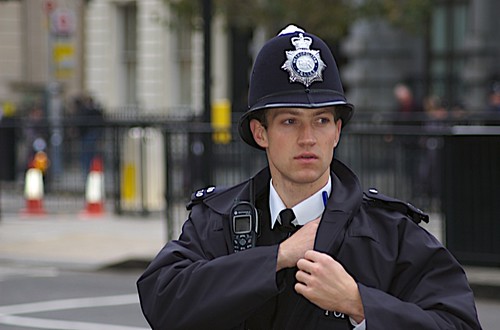 |
| The Old Bill. Though this seems to be an exceedingly Young Bill... |
“On the piss” – as distinct from “taking the piss”. There are two different meaning for this phrase, and I strongly suspect one is derived from the other. In the first instance to be “out on the piss” is to spend a night out drinking excessively. As in “The lads are out on the piss tonight.” As a corollary, for reasons that should be obvious, something that’s “on the piss” is wonky, or leaned over, or otherwise not straight up and down. As someone who is frequently required to fit large, bulky or awkwardly shaped items into the back of trucks, it’s a useful phrase. As in, “I don’t think that thing will go in straight up and down, but it might fit on the piss.”

The Leaning Tower of Pissa. (Note: using this photo in illustration of this phrase could also be described as taking the piss. Ah, it’s a subtle, malleable, expressive language…)
operating theatre = Operating Room. This is a favourite of cryptic crossword setters. They like to confuse with the phrase “theatre worker” meaning doctor or surgeon and not actor or stagehand. I find this particularly annoying. In fact, you could almost say it does my head in.
”Painting the Forth Bridge” – The Forth Railway Bridge is the famous Victorian-era cantilevered railway bridge in Scotland, which crosses the Firth of Forth between Edinburgh and Fife. It is, to put it mildly, rather on the large side. Hence the task of painting the bridge is assumed to be so immense and time-consuming that once you daub on the last brushful it’s time to go back to the other end and start over again. Thus, “painting the Forth Bridge” is a colourful way of describing a never-ending job. North Americans call this type of Sisyphean labour “painting the Golden Gate Bridge”. Sadly the phrase must soon be consigned to the bin because the Forth Bridge is currently getting a big makeover that involves blasting off every layer of paint until bare steel is revealed, making any necessary repairs, and then coating the whole bridge in some kind of super epoxy stuff that’s supposed to last for 25 to 40 years. This means the Brits will have to come up with some new phrase to denote a job that never ends; perhaps something else culturally appropriate like “Watching ‘Coronation Street’”. Or maybe we could simply say “blogging”.
pants = underwear. This is a really tough one, and one you don’t want to get wrong. What we think of as pants are “trousers”.
pants = Interestingly, “pants” is also an adjective that means lame or sucky. As in “The English World Cup team was totally pants".
paracetamol = acetaminophen-based pain reliever. Used generically, like we use Tylenol. As in "I went to the A&E bleeding from four different orifices and all they gave me was a bloody paracetamol and a tetanus jab"
“Pear-shaped” – When something’s gone pear-shaped it’s all gone wrong, off the rails, down the tubes. If the Apollo 13 astronauts had been English they would not have said “Houston, we have a problem”. They would have said, “Excuse me Houston… terribly sorry to bother… but if you’ve got just a mo’ we thought you might want to know that things up here have gone just a tiny bit pear-shaped.”
“Popped his clogs” – Just one in the long line of irreverent phrases used to describe someone who is, well, dead. Like six feet under, kicked the bucket, pushing up the daisies, shuffled off this mortal coil…

That parrot has popped his clogs.
porridge, doing = serving time in jail (though of course here that's spelled gaol. Strange but true.) Odd phrase... I believe it refers to the traditional breakfast served in prison. It would be used thusly: "Poor Nigel's doing porridge for running over a dachshund, pulling a flicknife on the owner, and then giving cheek to the Old Bill. He'll be gone for yonks."
proper = real. As in “Canadians play proper hockey, whereas the Brits run around on a field with curved sticks that are too short.” It’s also used in the sense of formal or correct, but more commonly in the first sense. I find myself using it that way all the time.
pub = Are you seriously telling me you don’t know what a pub is? Find yourself a different blog because you are seriously misguided. Perhaps you need a satnav…
pull a face, pulling faces = Making a face, making faces. I have no idea why one MAKES a face in Canada and PULLS a face here. However, pulling faces is part of a very odd rural English tradition, namely: gurning.
punter = a generic, somewhat dismissive term for customer. Punter once specifically meant someone who frequents race tracks and bets on horses (or bets on thing in general), and extended to mean a customer of a prostitute, but is now used more generically. As in “We’re just giving the punters what they want.”
“Pushing the boat out” – Has nothing whatsoever to do with boats. To “push the boat out” is to do something more extravagantly than usual, especially related to spending generously on a special occasion. For instance they really pushed the boat out on Will and Kate’s wedding. It’s also great to use ironically, as in “Wow, half a pint of lager shandy. You’re really pushing the boat our tonight!” (Note: lager shandy is a half-and-half mix of lager and lemonade (7-Up). So a drink that’s already watered down and then can’t even be tolerated in proper pint form is weedy in the extreme.)
"Result!" = a celebratory phrase used when commenting on a pleasing outcome. As in:
Woman with flattened dachshund: "They've finally locked up the bastard who ran over poor little Murgatroyd."
Sympathetic friend: "Result!"
roundabout = traffic circle. A means of keeping traffic flowing by having all cars enter a circular road and choose which exit they want, thus eliminating traffic lights and long waits at intersections (snort!). However, for those few readers who have fond memories of the 8th Street Traffic Circle in Saskatoon, most roundabouts are not much like that. For one thing, they go clockwise. For another, they are sometimes so big that you’re not really aware that you’re on one because there are shopping centres or odd public artworks or other large things in the middle, like Dame Edna, or Wales. Conversely, they can be so small they’re nothing more than a slightly raised hump in the middle of an intersection, with curved arrows painted on the pavement around it (These are largely ignored. The humps that is, not the arrows. People are pretty solidly clear on the clockwise thing…). Roundabouts also often have many different exits shooting off at odd angles, because streets in London almost NEVER meet at a right angle, especially when they are close to the Congestion Charging Zone.
A traffic sign leading into the roundabout at Elephant & Castle (which is not even remotely as exotic as it sounds… unless you find getting lost in a maze of underground walkways and cheap market stalls selling “used” electronics and pirated DVDs exotic).
row = pronounced to rhyme with "how". A fight or argument. Can also be used as a verb - to row, or rowing (again, rhyming with "how")
rubbish = garbage, in both its literal and figurative senses. As in “Please put that rubbish in the bin.” and “That James May is full of rubbish!”
satnav, short for Satellite Navigation = GPS. Almost everyone with a car seems to have a satnav. The coolest come equipped with several different voices. I’m sure that’s the case in North America too, but in NA do you get the mellifluous Irish guy? I could listen to him all night, even if he’s just saying, “After.. 400 yards.. go left… at the roundabout…”
Scouser = a person from Liverpool. Also with a distinctive accent, The Beatles are probably the most famous Scousers of all time.
Jamie Carragher, a Scouser and footballer who plays for Liverpool, demonstrating a strong Scouse accent. Thank you for the subtitles.
slag = a derogatory term for a promiscuous woman. “That Teresa has a revolving door to her bedroom. She’s such a slag.”
slapper = another word for a woman who will sleep with anyone. Any time. Anywhere.
“Sod it.” = Screw it. Also: “sod this”, “sod that”, “sod off”… you get the idea. “Sod” is also used in the rather more colourful phrase “Sod this for a game of soldiers!”, which generally means “Screw it, I’m not doing this anymore it’s too difficult / too expensive / no fun / not worth the effort.” For instance our man Nigel in the Land Rover, who has just flattened some poor woman's dachshund, might get tired of the situation and decide to make tracks at which point he he could preface his exit with “Sod this for a game of soldiers!”
"Sod's Law” – The British equivalent of “Murphy’s Law”, but with subtle and highly culturally revealing differences. Murphy’s Law is commonly quoted as “anything that can go wrong will go wrong”. Sod’s Law includes that idea but is broader, encompassing what Wikipedia calls “a general sense of being ‘mocked by fate’". Therefore Murphy’s Law would apply if you go out without an umbrella and it rains. Sod’s Law applies when you pack your umbrella, rain coat and wellies and the day turns out hot and sunny. Similarly the fact that Beethoven, the brilliant composer, became deaf… well that’s just Sod’s Law, innit? Do you see the distinction? Sod’s Law is for a people who don’t just expect that things will go wrong, but also expect an ironic twist of the knife while it’s all going down the pan. In other words, Sod’s Law is for the English.
stone = a unit of measure of weight equal to 14 pounds, which is bizarre and annoying to calculate in one’s head. Still, it’s the standard way to refer to the weight of people. As in the fictional (but not at all impossible) headline: “42 Stone Man forklifted out of council flat!" or the less likely “I lost 8 stone in just 7 weeks on the amazing 'Crisps and Kebabs Diet'”!
surgery = Doctor’s Office. It also means surgery as in “slicing open open of one’s body for medical purposes”, but if you’re making an appointment to see a GP, the appointment will be at the doctor’s surgery, even though they won’t actually perform surgery there. I find this really misleading and kind of alarming. It’s like calling barber shop a leechery. Maybe a few hundred years ago doctors did surgery at their surgery, but now they do it in an operating theatre.
swot = pronounced “swat”, like what you would do to a mosquito. Swot is a term for someone who does well in school and studies hard. Often used contemptuously by someone who does not do well in school and does not study hard. Sometimes used, with typical English false modesty, by people describing themselves: “Yes, I got 23 A levels in school. I was a right little swot.”
“Taking the piss” – this is a phrase that goes right to the heart of all things English. To take the piss out of someone is to mock, tease or ridicule them, particularly someone who is especially full of himself. The English have a finely honed sense of when people are getting a bit too uppity, and are quick to deflate them when they do. So taking the piss is a combination of the Englishness of not pushing oneself forward, and the all-pervasive sense of humour, and it happens all the time. Whole TV shows are essentially just extended sessions of taking the piss (“Mock the Week”, anyone?).
“Taking the piss” can also be used to describe an action or situation that’s out of line or unfair. For instance, I recently tweeted about the price of a pint of lager shandy in a Richmond pub. £3.95? For a lager shandy? That’s just taking the piss.
The phrase is sometimes euphemistically changed to “taking the Mickey” in mixed company. I’ve even heard the phrase “taking the Michael” as a variation on Mickey. (“Mickey” is a Cockney rhyming slang substitution, but I’m not even going to contemplate getting into Cockney rhyming slang right now because that is most definitely a whole other post.)
toe rag = a somewhat out-of-fashion word meaning either a worthless, dirty, disgusting person or a sly, deceptive or slightly criminal type, or possibly both. Online sources claim that toe rag has mostly passed out of use in favour of terms like tosser and wanker, but I did hear it in the wild from a native speaker not too long ago, and I just like it, so I include it here.
toff = refers to an upper class person, usually male, and almost certainly educated at public school. (Note: a public school is exactly the opposite of what it sounds like. Not public at all, they are, in fact, very private and very expensive.) A toff is born to the title, and is likely to have a passing acquaintance with polo (not just the shirts), Abercrombie & Fitch and at least one woman named Tabitha. David Cameron (the current Prime Minister of the UK) is a toff, though he desperately tries to distance himself from that label to the extent that he first claimed he would wear a business suit (not tails) to the wedding of Prince William and Catherine Middleton. Media reports claimed this was because of a photo that surfaced years ago showing him in morning dress (tails) as a member of the Bullingdon Club at Oxford, thus forever cementing his status as a toff. (from The Telegraph).
 The famous photo of the Bullingdon Club. Cameron is pictured second from the left at the back. Also pictured is a young Boris Johnson, current Mayor of London, seated on the right. Johnson is also most certainly a toff. (Poor man, how could he NOT be, when his full name is Alexander Boris de Pfeffel Johnson?)
The famous photo of the Bullingdon Club. Cameron is pictured second from the left at the back. Also pictured is a young Boris Johnson, current Mayor of London, seated on the right. Johnson is also most certainly a toff. (Poor man, how could he NOT be, when his full name is Alexander Boris de Pfeffel Johnson?)
tosser = Originally may have derived from “toss pot” which is apparently an old sailor’s term for someone who drinks a lot. Now it’s used interchangeably with wanker, though it’s perhaps slightly less harsh.
tube = the London Underground System
wanker = literally, one who masturbates. More generally it’s a catch-all derogatory term for someone North Americans might describe as a jerk (note the similar etymology), bastard or asshole.
yonks = A very long time. As in “Nigel! I haven’t seen you in yonks, mate! Say, do you realise you’ve just run over that woman’s dachshund?”
Zimmer Frame = walker. Like the kind used by people unsteady on their feet. As in this particularly lame joke I made up: Q: How can you tell if a goldfish is really old? A: He swims around his bowl with a tiny Zimmer frame. (*RIMSHOT* “Thankyouverymuch, I’m here all week. Try the shrimp cocktail…”)
(Last updated 7-11-11)
(Last updated 7-11-11)

